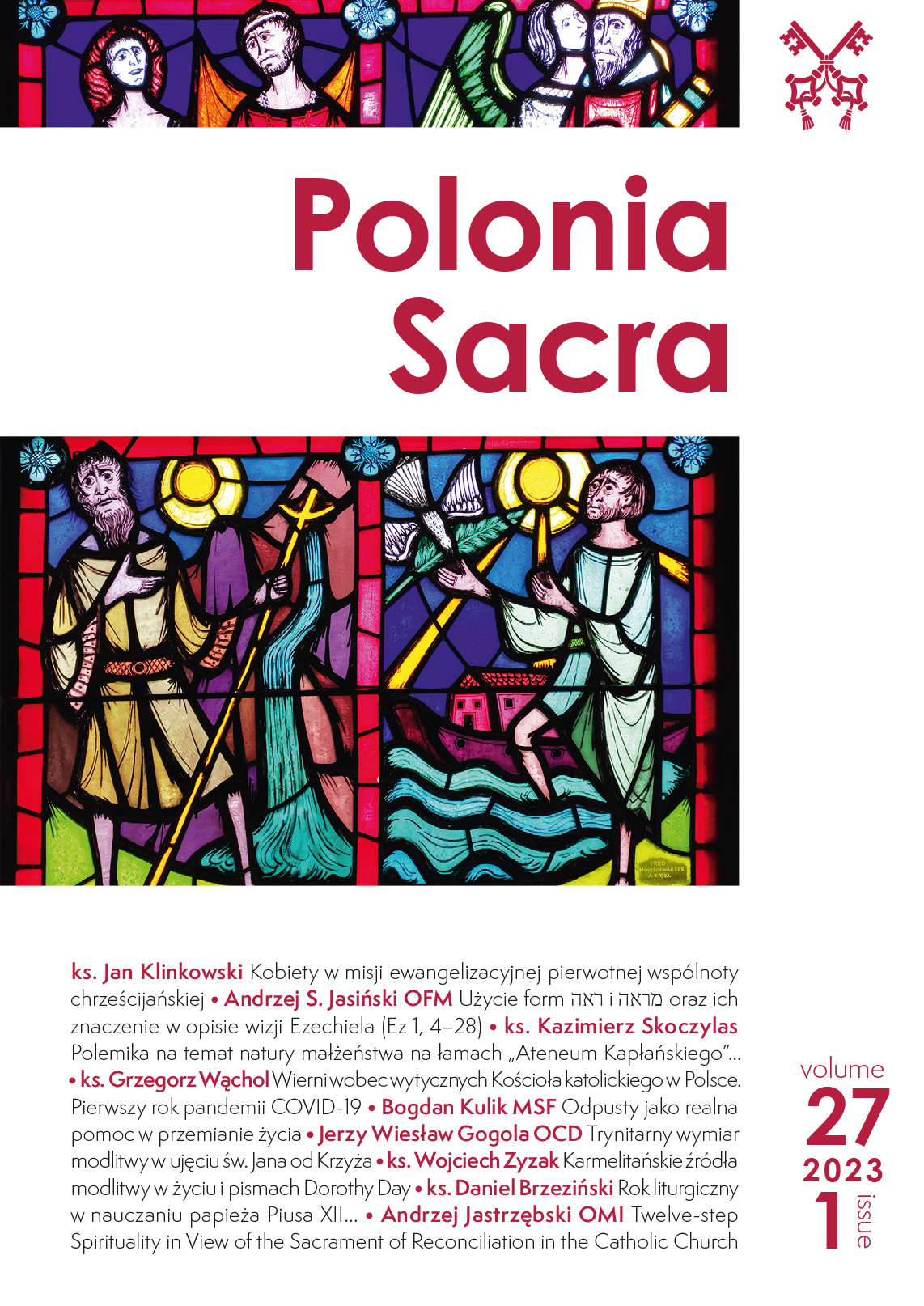Twelve-step Spirituality in View of the Sacrament of Reconciliation in the Catholic Church
DOI:
https://doi.org/10.15633/ps.27109Słowa kluczowe:
spowiedź, programy dwunastu kroków, nałogi, sakrament pojednaniaAbstrakt
W tym artykule zagłębiamy się w podstawowe zasady programu dwunastu kroków, badając jego podobieństwo do dynamiki sakramentu pojednania w Kościele katolickim. Artykuł rozpoczyna się krótką prezentacją teologicznych podstaw spowiedzi i kontynuuje przedstawieniem zarysu historii programu AA opartego na dwunastu krokach. Główna analiza poświęcona jest wykazaniu i omówieniu podobieństw oraz paraleli w treści dwunastu kroków oraz warunków dobrej spowiedzi. Podobnie jak program dwunastu kroków, również sakrament pojednania zaprasza penitenta do przejścia podobnych etapów: aktu skruchy, rachunku sumienia, wyznania grzechów oraz zadośćuczynienia. Na zakończenie autor rozważa wskazania duszpasterskie mające ułatwić pracę z wierzącymi, którzy zmagają się z różnymi nałogami.
Bibliografia
Alcoholics Anonymous World Services, A. A. Fact File, New York 2018, https://orangenyaa.org/wp-content/uploads/2018/10/aa_fact_file.pdf (22.09.2022).
Alcoholics Anonymous, Alcoholics Anonymous (3rd ed.), New York 1976.
Alcoholics Anonymous, Twelve Steps and Twelve Traditions, New York 1981.
Borkman T., The Twelve-Step Recovery Model of AA: A Voluntary Mutual Help Association, “Recent Developments in Alcoholism” 2008, p. 9–35, https://doi.org/10.1007/978-0-387-77725-2_2.
Bullitt-Jonas M., Climate Change, Addiction, and Spiritual Liberation, “Religions” 12 (2021) nr 709, p. 1–15, https://doi.org/10.3390/rel12090709.
Cheever S., My name is Bill: Bill Wilson—His life and the creation of Alcoholics Anonymous, New York 2004.
Connors G. J., Walitzer K. S., Tonigan J. S., Spiritual Change in Recovery, “Recent Developments in Alcoholism” 2008, p. 209–27, https://doi.org/10.1007/978-0-387-77725-2_12.
Denzin, N., Interpretative Biography, London 1989.
Dermatis H., Galanter M., The Role of Twelve-Step-Related Spirituality in Addiction Recovery, “Journal of Religion and Health” 55 (2016) nr 2, p. 510–521, https://doi.org/10.1007/s10943-015-0019-4.
Dossett W., Addiction, Spirituality and 12-Step Programmes, “International Social Work” 56 (2013) nr 3, p. 369–83, https://doi.org/10.1177/0020872813475689.
Galanter M., Spirituality and Recovery in 12-Step Programs: An Empirical Model, “Journal of Substance Abuse Treatment” 33 (2007) nr 3, p. 265–72, https://doi.org/10.1016/j.jsat.2007.04.016.
Gross M., Alcoholics Anonymous: Still Sober After 75 Years, “American Journal of Public Health” 100 (2010) nr 12, p. 2361–2363, https://doi.org/10.2105/AJPH.2010.199349.
Hänninen V., Koski‐Jännes A., Narratives of recovery from addictive behaviours, “Addiction” 94 (1999), p. 1837–1848, https://doi.org/10.1046/j.1360-0443.1999.941218379.x
Hart K. E., A spiritual interpretation of the 12-steps of Alcoholics Anonymous: From resentment to forgiveness to love, “Journal of Ministry in Addiction & Recovery” 6 (1999) nr 2, p. 25–39.
Hathaway D. B., Dawes M., Addiction and Twelve-Step Spirituality, in: Christianity and Psychiatry, eds. J. R. Peteet, H. S. Moffic, A. Hankir, H. G. Koenig, Cham 2021, p. 147–162, https://doi.org/10.1007/978-3-030-80854-9_11.
Kaskutas L. A., Ammon L., Delucchi K., Room R., Bond J., Weisner C., Alcoholics Anonymous Careers: Patterns of AA Involvement Five Years after Treatment Entry, “Alcoholism, Clinical and Experimental Research” 29 (2005) nr 11, p. 1983–1990, https://doi.org/10.1097/01.alc.0000187156.88588.de.
Kelly J., White W., Broadening the Base of Addiction Mutual-Help Organizations, “Journal of Groups in Addiction & Recovery” 7 (2012) nr 2–4, p. 82–101.
Kelly J. F., Humphreys K., Ferri M., Alcoholics Anonymous and Other 12‐step Programs for Alcohol Use Disorder, “Cochrane Database of Systematic Reviews” nr(2020) nr 9, https://doi.org/10.1002/14651858.CD012880.pub2.
Kelly J. F., Is Alcoholics Anonymous religious, spiritual, neither? Findings from 25 years of mechanisms of behavior change research, “Addiction” 112 (2017), p. 929–936.
Khantzian E. J., Mack J. E., Alcoholics Anonymous and contemporary psychodynamic theory, in: Recent developments in alcoholism, 7: Growth and Transformation in Workplace Alcoholism Programming, ed. M. Galanter, New York 1994, p. 68–89.
McMinn M. R., Psychology, Theology, and Spirituality in Christian Counseling, Carol Stream 2011.
McMinn M. R., Sin and Grace in Christian Counseling: An Integrative Paradigm, Downers Grove 2008.
Moos R. H., How and Why Twelve-Step Self-Help Groups Are Effective, “Recent Developments in Alcoholism” 2008, p. 393–412, https://doi.org/10.1007/978-0-387-77725-2_22.
Perrin D. B., The Sacrament of Reconciliation. An Existential Approach, Lewiston 1998.
Rodriguez-Morales L., ‘That’s the Spiritual Side of Me’: Men’s Autobiographical Accounts of Recovery in Twelve Step Fellowships, “Implicit Religion” 22 (2020) nr 2161–2183, https://doi.org/10.1558/imre.38499.
Stafford T., The Hidden Gospel of the 12 Steps, “Christianity Today (Washington)” 35 (1991) nr 8, p. 14–19.
Swora M. G., The rhetoric of transformation in the healing of alcoholism: The twelve steps of Alcoholics Anonymous, “Mental Health, Religion & Culture” 7 (2004), p. 187–209. https://doi.org/10.1080/13674670310001602445.
Pobrania
Opublikowane
Numer
Dział
Licencja

Utwór dostępny jest na licencji Creative Commons Uznanie autorstwa 4.0 Międzynarodowe.
Autorzy publikujący w czasopiśmie udzielają jego wydawcy zgody o następującej treści:
- Autor zachowuje autorskie prawa majątkowe do utworu, a jednocześnie udziela wydawcy czasopisma zgody na jego pierwszą publikację w wersji drukowanej i wersji online na licencji Creative Commons Uznanie autorstwa 4.0 Międzynarodowe oraz zgody na wykonywanie opracowań, w tym przekładów.
- Autor ma możliwość udzielania zgody niewyłącznej na opublikowanie utworu w wersji, która ukazała się w czasopiśmie (np. zamieszczenia go w repozytorium instytucjonalnym lub opublikowania w książce), wraz z informacją o jego pierwszej publikacji w czasopiśmie.
- Autor może umieścić swój utwór online (np. w repozytorium instytucjonalnym lub na swojej stronie internetowej) jeszcze przed zgłoszeniem utworu do czasopisma.

